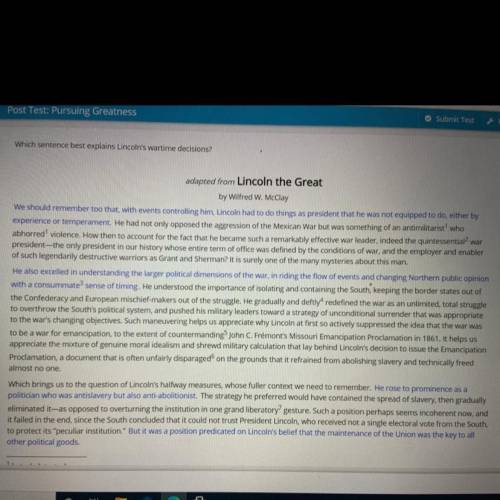Which sentence best explains Lincoln's wartime decisions?
BRANLIEST
adapted from Lincoln the...

English, 01.04.2021 17:30 cassidy32504
Which sentence best explains Lincoln's wartime decisions?
BRANLIEST
adapted from Lincoln the Great
by Wilfred W. McClay
We should remember too that, with events controlling him, Lincoln had to do things as president that he was not equipped to do, either by
experience or temperament. He had not only opposed the aggression of the Mexican War but was something of an antimilitarist who
abhorred' violence. How then to account for the fact that he became such a remarkably effective war leader, indeed the quintessential war
president--the only president in our history whose entire term of office was defined by the conditions of war, and the employer and enabler
of such legendarily destructive warriors as Grant and Sherman? It is surely one of the many mysteries about this man.
He also excelled in understanding the larger political dimensions of the war, in riding the flow of events and changing Northern public opinion
with a consummate sense of timing. He understood the importance of isolating and containing the South, keeping the border states out of
the Confederacy and European mischief-makers out of the struggle. He gradually and deftly redefined the war as an unlimited, total struggle
to overthrow the South's political system, and pushed his military leaders toward a strategy of unconditional surrender that was appropriate
to the war's changing objectives. Such maneuvering helps us appreciate why Lincoln at first so actively suppressed the idea that the war was
to be a war for emancipation, to the extent of countermanding John C. Frémont's Missouri Emancipation Proclamation in 1861. It helps us
appreciate the mixture of genuine moral idealism and shrewd military calculation that lay behind Lincoln's decision to issue the Emancipation
Proclamation, a document that is often unfairly disparaged on the grounds that it refrained from abolishing slavery and technically freed
almost no one.
Which brings us to the question of Lincoln's halfway measures, whose fuller context we need to remember. He rose to prominence as a
politician who was antislavery but also anti-abolitionist. The strategy he preferred would have contained the spread of slavery, then gradually
eliminated it-as opposed to overturning the institution in one grand liberatory gesture. Such a position perhaps seems incoherent now, and
it failed in the end, since the South concluded that it could not trust President Lincoln, who received not a single electoral vote from the
South,
to protect its "peculiar institution." But it was a position predicated on Lincoln's belief that the maintenance of the Union was the key to all
other political goods.


Answers: 3


Other questions on the subject: English

English, 21.06.2019 16:30, taylorbean315
Imagine if going to work every day meant your life thats the reality that meat packers in this county face with some of the highest rates of injury and death of any profession i myself worked at such a facility for two years and can resport on the unsafe conditions firsthand
Answers: 1

English, 21.06.2019 22:10, Lovergirl13
What does this excerpt from act of romeo and juliet reveal about lord montague?
Answers: 1

English, 22.06.2019 00:30, ariloveshorses
What causes cassius to delay killing caesar? a. the crowds around caesar b. a violent storm c. brutus’s reluctance d. the disorganization it the resistance
Answers: 2

English, 22.06.2019 01:50, TheBurntToast
To meet the needs of commuters in the industrial age, city planners implemented the use of phonographs. provided more horses and carriages. borrowed technology from railroads. constructed new telephone lines.
Answers: 1
You know the right answer?
Questions in other subjects:


Mathematics, 17.09.2019 15:30

History, 17.09.2019 15:30



History, 17.09.2019 15:30

Biology, 17.09.2019 15:30

Arts, 17.09.2019 15:30


History, 17.09.2019 15:30



